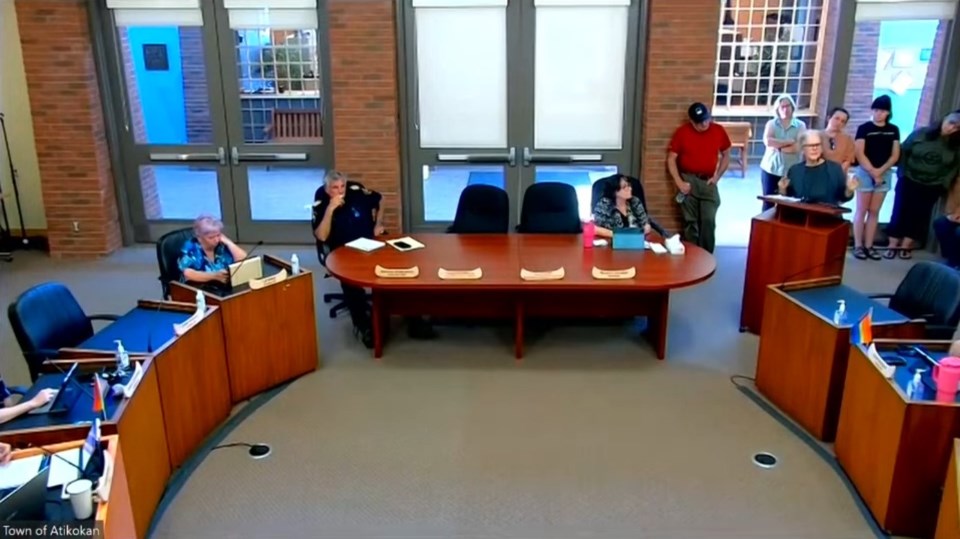ATIKOKAN – Sally Burns had no difficulty explaining her motivation for being part of We the Nuclear Free North’s delegation to town council.
“I grew up here and I don’t want to see (the area) poisoned or ruined or compromised by what I think of as toxic nuclear waste,” the longtime Atikokan resident said Tuesday, the day after she spoke to the town’s governing body.
“So,” she continued, “when We the Nuclear Free North was looking for somebody local . . . they asked me and I thought, ‘Yes, I’m willing to do this.’”
Burns said as a former member of town council, “I know that they can be swayed by groups coming to talk to them, if there’s a significant crowd there.”
A “significant” number of town residents did show up for support, she added.
Speaking up was “important because I love this part of the world,” she said.
Burns and Brennain Lloyd, a North Bay resident, made a brief presentation to town council in which they asked councillors to take a formal position against nuclear waste storage in the region.
The deputation was in response to a staff report and resolution presented to Atikokan council on May 13.
The report touted small modular reactors as an example of “innovative and environmentally responsible energy projects” that the town should support.
A small modular reactor is a factory-assembled nuclear reactor that can be transported to a location to produce up to 300 megawatts of electricity.
The report also recommended the town endorse the underground nuclear waste repository proposed by the Nuclear Waste Management Organization for possible construction west of Ignace and northwest of Atikokan.
The proposed deep geological repository would keep Canadian reactors’ spent fuel rods hundreds of metres below ground level.
The Northwestern Ontario location is one of two finalists for siting the repository, with a decision slated to be made by the nuclear organization late this year. The other possible site is near Lake Huron.
At a committee of the whole meeting Monday afternoon, Burns asked council to pass a bylaw declaring Atikokan a nuclear-free zone.
A bylaw is preferred over a resolution because resolutions are effective only for the sitting council’s term, she told them.
Lloyd, of the Nuclear Free North member organization Northwatch, told councillors a deep geological repository in Northwestern Ontario would carry considerable risks for Atikokan and other communities.
With some risks – such as releases of radiation – the probability is not just high but certain, she said.
Atikokan and many other communities will share in the risk of trucks carrying nuclear waste crashing, she said.
Lloyd provided a draft resolution for council to consider.
Similar or identical resolutions have been passed by other municipalities’ councils recently, she said.
Red Rock’s township council passed a resolution in March saying it “urges the Nuclear Waste Management Organization to find storage solutions for nuclear waste in the vicinity of the reactor stations where the waste is and not pursue the transport of these radioactive wastes to Northern Ontario.”
Nipigon and La Vallee councils passed virtually identical resolutions in March.
Lac Seul First Nation’s chief and council issued a statement to members on March 28 expressing opposition to “the storage of nuclear waste in Lac Seul traditional territories or our wider Treaty 3 territory.”
Asked about small modular reactors, Lloyd said they “share the same problems” as conventional reactors, including radioactive waste.
They are also highly expensive and produce radioactive waste, she said, adding that there are better options for producing electricity.
